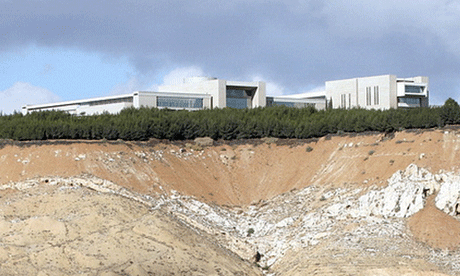Life Goes On in Damascus and Out Elsewhere
"Everything is changing. We can feel it. The people are tired. And the state is under such great strain, it's a kind of miracle that it's still going."
Waddah Abd Rabbo, editor-in-chief, Al Watan newspaper, Syria
In the capital, fatigue has long since set in over a conflict that has taken years from peoples' lives; correction taken years to take peoples' lives. Many of those who survive have travelled from disparate parts of the country to Damascus, in an effort to survive there. Najieh Dahir from Deir al-Zour, now a city besieged in the far east of Syria and under Islamic State tender care, left her daughter behind: "One wrong move, and they'll cut the hand off. Or they can take you as a slave". Her husband also remained behind: "He's no use to me anymore. He hasn't sent any money. I hope a shell lands on him."
Giant posters of Bashar al-Assad glow benevolently down on the people from signboards everywhere. His portrait smiles its blessing in immigration centres, from city streets, and on the walls of army bases. His portrayals suit the occasion and the venue, from a statesman to a military commander and increasingly in the comradely presence of Hassan Nasrallah of Hezbollah or Vladimir Putin of Russia. Russian warplanes have done Russia and Syria proud in their attacks on opposition areas and hapless citizens there.
The chaotic conflict of bombing and shelling, poison gas and barrel bombs that has shattered so many neighbourhoods and those living in them have become tiresomely commonplace, but since they hit specific areas, they can also be avoided. An air of normalcy prevails, despite the desperate plight of many in the capital resulting from five years of war that has destroyed the lives of over a quarter-million people, and sent five million into refugee camps nearby. Ghouta is under blockade, regularly bombarded by government forces.
Shells no longer hit the city centre, nor the Bab Sharqi gate. People flock to Pub Sharqi to smoke water pipes, or they watch football at the "80's" bar next door. And more pubs have opened. As they have, greater numbers of young people congregate to them. At army roadblocks traffic jams are created throughout the city as soldiers carrying assault rifles sweep vehicles for bombs and distant artillery fire can frequently be dimly heard.
 |
| The $1-billion-dollar New Shaab marble Palace looms over Damascus. Photograph: Flickr/Nawar-2012 |
Syria has certainly been transformed. Once a country that boasted itself as being in the middle-income range, there remains a small minority still able to afford living well. Many of the younger contingent have opted to ship themselves abroad, while over half the pre-war population has been displaced. The city's Great Mosque, revered as one of the holiest in Islam, has been untouched by the bloody conflict. Its caretaker, Salim al-Rifai, 85, is proud custodian of a small shrine containing the head of John the Baptist, so rumoured.
He speaks while fingering his beads, of the enormous change that has taken place in the Syria he has long known. "The difference between sky and earth." Calamitous as it has been and yet is, it will not last forever, he sighs with longing: "This too, will pass", he promises. Meanwhile, that air of normalcy is perpetuated by fashionable weddings wending through the weekend streets, beckoning the still-wealthy to gather at plush restaurants and bars for meals and to smoke water pipes.
"People are tired of war and just want to live a normal life, so they go out, they socialize. In the last few months it's not just at the weekends, it's every day. Places are crammed. You practically see a cross-section of society coming out", commented bartender Dana Daqqaq, a 21-year-old with bleached-blonde hair who works at night while studying for her fine arts degree.
0 Comments:
Post a Comment
<< Home